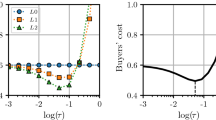Abstract
Service management at commodity goods retailers requires various kinds of strategic knowledge. This paper focuses on the (dis)advantages of mileage point and discount services. To uncover the characteristics of the two strategies, we are developing an agent-based simulator to analyze the behaviors of competing retailing stores and their customers. The retailer agents adaptively increase or decrease sales promotion of mileage point service and discounting based on their experiences and strategies to acquire customers. Customer agents, on the other hand, make a decision to choose one of the two retailers to repeatedly purchase daily commodities based on customer types and utilities. To explore the better strategies of retailers, we have conducted intensive simulation experiments. Our computational results have shown that the emergence of retailors’ cooperative behaviors and their stable relations strongly depends on to what extent the retailers decide the discounting rather than mileage point strategy at the very first stages.
Access this chapter
Tax calculation will be finalised at checkout
Purchases are for personal use only
Preview
Unable to display preview. Download preview PDF.
Similar content being viewed by others
References
Toriyama, M., Kikuchi, T., Yang, C., Yamada, T., Terano, T.: Who is a Key Person to Transfer Knowledge in a Business Firm - Agent-Based Simulation Approach. In: Proc. 5th Knowledge Management in Organizations, KMO 2010, pp. 41–51 (2010)
Kobayashi, T., Takahashi, S., Kunigami, M., Yoshikawa, A., Terano, T.: The Effect of Management Style Formalization with Growth of Organization - An Agent-Based Model. In: Proc. 6th Knowledge Management in Organizations, KMO 2011, p. 20 (2011)
Chen, S.-H., Terano, T., Yamamoto, R. (eds.): Agent-Based Approaches in Economic and Social Complex Systems. In: VI -Post-Proceedings of the AESCS (2011)
International Workshop 2009. ABSS, vol. 8. Springer (2009)
Dowling, G.R., Uncles, M.: Do Customer Loyalty Programs Really Work? MIT Sloan Management Review, 16 pages (1997)
Berman, B.: Developing an Effective Customer Loyalty Program. California Management Review 49(1), 123–148 (2006)
Liu, Y.: The Long-Term Impact of Loyalty Programs on Consumer Purchase Behavior and Loyalty. Journal of Marketing 71(4), 19–35 (2007)
Humby, C., Hunt, T., Phillips, T.: Scoring Points How Tesco Continues to Win Customer Loyalty. Kogan Page Ltd. (2008)
Yi, Y., Jeon, H.: Effects of loyalty programs on value perception, program loyalty, and brand loyalty. Journal of the Academy of Marketing Science 31(3), 229–240 (2003)
Kutschinski, E., Uthmann, T., Polani, D.: Learning Competitive Pricing Strategies by Multi-Agent Reinforcement Learning. Journal of Economic Dynamics and Control 27(11-12), 2207–2218 (2003)
DiMicco, J.M., Greenwald, A., Maes, P.: Learning Curve: A Simulation-Based Approach to Dynamic Pricing. Electronic Commerce Research 3, 245–276 (2003)
Gibbons, R.: Game Theory for Applied Economists. Princeton University Press (1992)
Kobayashi, M., Kunigami, M., Yamadera, S., Yamada, T., Terano, T.: How a Major Mileage Point Emerges through Agent Interactions using Doubly Structural Network Model. In: WEIN 2009 (Workshop on Emergent Intelligence on Netwoked Agents) (2009)
Doan, R.J., Simon, H.: Power Pricing. Free Press (1997)
Taylor, G.A., Neslin, S.A.: The Current and Future Sales Impact of a Retail Frequency Reward Program. Journal of Retailing 81(4), 293–305 (2005)
Author information
Authors and Affiliations
Editor information
Editors and Affiliations
Rights and permissions
Copyright information
© 2013 Springer-Verlag Berlin Heidelberg
About this paper
Cite this paper
Tanaka, Y., Yamada, T., Yamamoto, G., Yoshikawa, A., Terano, T. (2013). Points or Discount for Better Retailer Services. In: Uden, L., Herrera, F., Bajo Pérez, J., Corchado Rodríguez, J. (eds) 7th International Conference on Knowledge Management in Organizations: Service and Cloud Computing. Advances in Intelligent Systems and Computing, vol 172. Springer, Berlin, Heidelberg. https://doi.org/10.1007/978-3-642-30867-3_43
Download citation
DOI: https://doi.org/10.1007/978-3-642-30867-3_43
Publisher Name: Springer, Berlin, Heidelberg
Print ISBN: 978-3-642-30866-6
Online ISBN: 978-3-642-30867-3
eBook Packages: EngineeringEngineering (R0)




